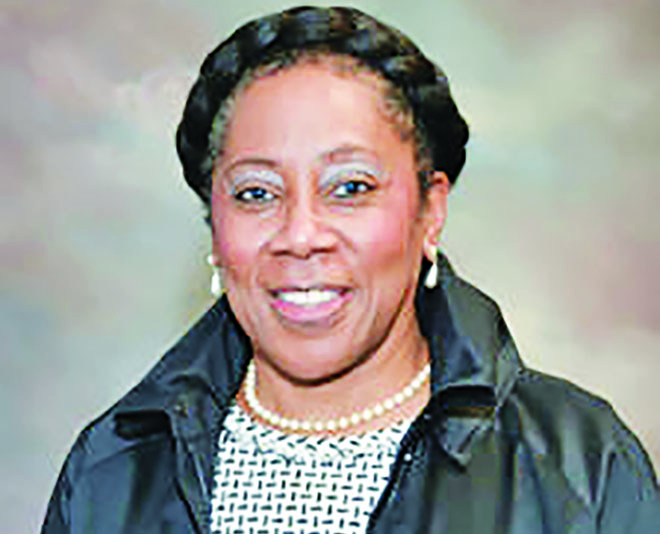
An interview with Guilford County Medical Director Dr. Annette Bey

By Dr. Veita Bland

At this time, COVID-19 dominates our thoughts and dictates the actions of our lives. We recognize the national names that direct this pandemic but who is directing the local aspects of this public health crisis. Who is responsible for the local management of our everyday existence in this pandemic?
One of those people is Dr. Annette Bey.
Dr. Bey is the Medical Director for the Guilford County Division of Public Health, which she joined in January of this year. Dr. Bey is a graduate of Howard University College of Medicine. She is trained as an Obstetrician/Gynecologist, a champion of Community Health and a fierce protector of individual health. With questions generated by the Peacemaker staff, I recently had the opportunity to interview her and get her take on what is happening locally.
How is our COVID-19 testing going in Guilford County?
Dr. Bey: There has not been robust testing in our county. We are behind when compared to other counties and states. We have a population of 535,000. There have been 191 positive tests with 13 deaths, at this time.
We are not the only county or state behind in testing. Initially, this was because testing kits were limited and the criteria for testing changed. We are now at a point where we can prioritize testing and providers have more options for testing with the supply chain for commercial labs increasing for COVID-19 kits.
High risk groups that are prioritized for testing include: the symptomatic hospitalized population, health care providers, first responders, those who are age 65 years and over, patients in congregate living situations, and patients at higher risks for severe illness such as those with chronic illness.
When will there be widespread testing here?
Dr. Bey: We are gearing up to increase community testing as we are hopeful that we will be able to increase our inventory of testing kits. Community testing remains a priority for the Health Department.
Is there a current move by the Health Department to solicit volunteers/workers to help ramp up contact tracing?
Dr. Bey: There are no plans to solicit volunteers as we are dealing with protected health information and are deploying current nursing staff from other areas for this task. Since the beginning of this pandemic the Health Department has continued and not stopped contact investigation for COVID-19 positive patients. In addition, as testing ramps up, we currently and will continue to have redeployment of staff to assist with this.
Can you identify any patterns you are seeing locally in data as it relates to African Americans?
Dr. Bey: The data for Guilford County cases are low with a count of 191 persons positive, at this time. It is obvious that we are seeing disproportionately positive cases in the African American community when the raw data is analyzed. Fifty percent of the cases were African American and 50 percent were Caucasian. The African American population in Guilford County is between 33-34 percent. This is a disproportionate distribution. Statewide the African American population is 22 percent but the distribution of positive cases is at 37 percent.
Where are we on the “curve” regarding the number of cases over time? Can we tell that our curve is actually flattening without adequate widespread testing and contact tracing?
Dr. Bey: As far as the numbers on the curve, we must increase the testing in order to make that statement. Activities such as the stay-at-home orders, social distancing, and the wearing of face coverings will support us in controlling widespread community spreading of COVID-19. We are positive that with the policies that Governor Cooper has put in place, we will see a slowing in the number of new cases, the numbers of people in hospitals and the number of deaths. But as far as flattening out the curve we have not reached that point. We will continue to track and trend data before making this determination.
Again, we encourage people to wear a face cover, to continue social distancing and to stay home when you are sick. Continuing all activities that decrease community spread will help us reach the flattening of the cure. (Reference CDC website for explanation of “flattening the cure.”).
We want to impress upon the community the guidance of social distancing and staying home. These are the behaviors a community must buy into to positively affect a pandemic. Testing, tracing, and trends are the three T’s that will help us handle this pandemic successfully.
The three T’s will help guide the state of North Carolina as to when to loosen restrictions as we move into our new normal.
We at the Health Department are investigating disparities. We know health disparities make the African American population more vulnerable. When looking at populations that have disparate outcomes for hypertension, diabetes, lung disease, kidney disease, heart disease, liver disease and diseases of the immune system, the numbers for African Americans are higher. Public Health’s goals are to impact early in the disease process because we know African Americans have adverse responses to these diseases as they become chronic.
We want to provide access to primary care, treatment for chronic diseases, and support for healthy lifestyle change.
This is not solely an individual endeavor but an endeavor that society must recognize. This pandemic has uncovered how health disparities negatively impact the health ability of the African American community to respond to COVID-19.
We still have work to do with COVID-19 and work to do in improving the inequalities in our society to improve health outcomes in the African American community.
Improving social determinants of health such as housing, employment, transportation and access to health care are important areas that continue to remain a challenge.
Thank you, Dr. Bey, for taking the time out of your busy schedule to help us understand how our local officials take on COVID-19.
Dr. Veita Bland is a board-certified Greensboro physician and hypertension specialist. Dr. Bland’s radio show, “It’s a Matter of Your Health,” can be heard live on Wednesdays, 5:30 p.m. on N.C. A&T State University’s WNAA, 90.1 FM. Listeners may call in and ask questions. The show is replayed on Sirius 142 at 5 p.m. on Wed. Email Dr. Bland at ideas@blandclinicpa.com.

